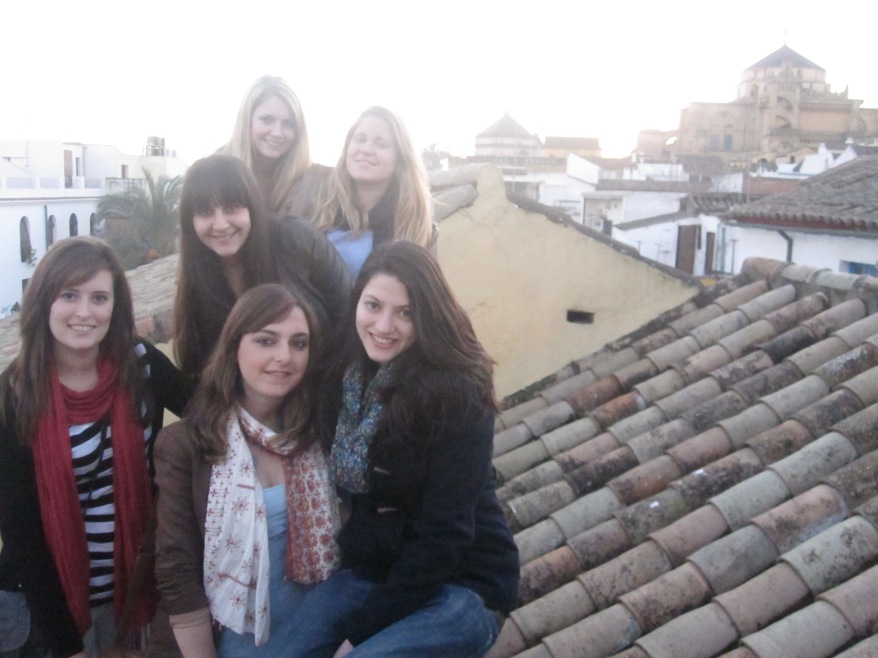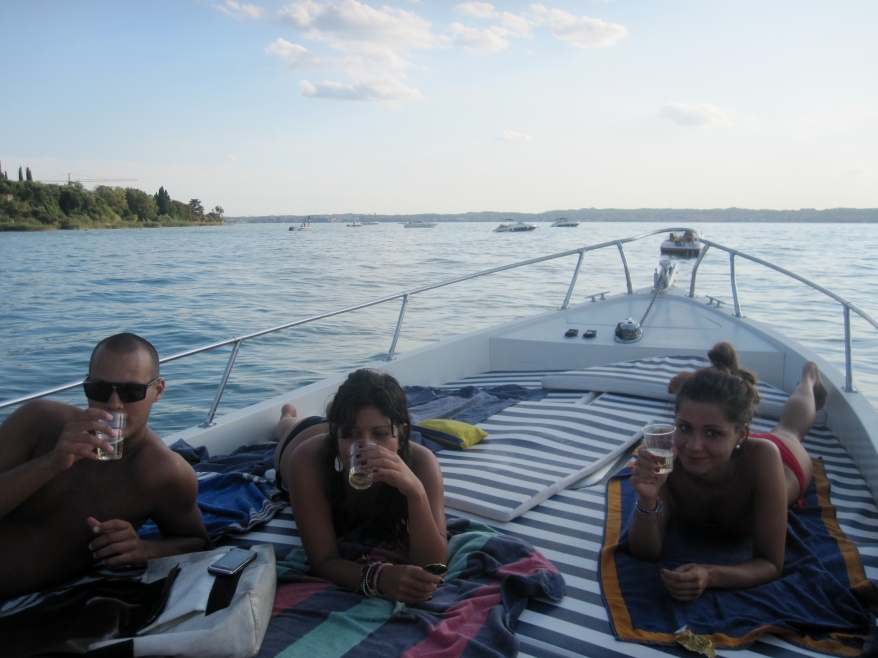My Top 10 Tips for Learning a Foreign Language
Within the next month or so, thousands upon thousands of students all over Europe will be packing their bags and joining the legions of 3 million Europeans before them who have done Erasmus. For those of you who haven’t heard of it, Erasmus is one of the best things about the European Union (in my opinion, at least) and it is a programme available to any university student in an EU country. It offers you a very simple way to study abroad, work abroad in a company or teach your native language in a school abroad.
In the UK people tend to begin their Erasmus placement in the September of their Third Year Abroad, but in other countries some people begin in September or in February.
Many of those lucky people setting off for their Erasmus year (or semester) will be doing so with a number of aims in mind: to discover a new culture, gain valuable experience of living abroad (much prized by future employers – I can promise you!). One aim almost everyone will share is the desire to either learn or perfect a foreign language. Living abroad is a fantastic opportunity to do so, but there are certain things you can do to make sure you take full advantage of the experience. So here are my top 10 tips for learning a foreign language, from someone who did the Erasmus experience twice over, once in Spain for 6 months and then in Italy for another 6 months. I’ve tried to make these tips relevant for anyone, Erasmus or not.
1. Share a flat with locals
Locals who preferably don’t speak your mother tongue. In a new country it can seem very tempting to move in with fellow expats, but if you do so then you immediately limit your exposure to the foreign language and therefore halve your chances of perfecting it. An added benefit of living with locals is they can introduce you to the local culture, cuisine (ie. their grandfather’s homemade Limoncello or the local speciality of paella), their friendship group, and generally become an invaluable source of local knowledge.
2. Move abroad alone
Very closely linked to no.1, move to your new city of choice alone if possible. You may be delighted to find out that you and your best friend from home will be living in the same city, but this won’t really give you the true experience and it won’t lift you out of your comfort zone. If at all possible, move to a totally new city with a completely blank address book.
3. Date a local
Find yourself a native boyfriend or girlfriend, again preferably one who doesn’t speak your mother tongue. It’s true that a boyfriend/girlfriend will improve your language skills better than anything else as you’re likely to be spending lots of time with them, and they have the patience to hear you out, even if your sentences are splattered with grammar mistakes. Our Year Abroad Co-ordinator at Exeter (a very straight-talking and to-the-point woman, it has to be admitted) even advised those of us with boyfriends/girlfriends at home to dump them before the Year Abroad (!) specifically in order to learn the language through a local lover.
4. Cut yourself off from your home country
Change your internet homepage to a local newspaper in a foreign language (for example, El País in Spain & Corriere della Sera in Italy), block websites you always use at home, including radio stations and TV channels. Instead add a foreign radio station to your homepage. Take out foreign books from the library, go to the local cinema, watch local television and try to immerse yourself completely. I’m not saying you should delete your Facebook account or cut all ties to your family and friends, but limiting the amount of your native language that you hear and read will do wonders.
5. Make friends with locals
Hopefully you’ll automatically make friends with other students, your colleagues or other language assistants. Don’t fear if not, as there are other ways to make friends in a new country. If you enjoy tennis, join the nearest tennis club and attend a mix-in. Volunteer to help out with a local charity, which will be more than happy to accept you and will help you to meet other volunteers. Any hobby you have is likely to be popular with others in your new country, so make an effort to find them.
6. Write a diary in a foreign language
Forcing yourself to record the ins and outs of your experience abroad will force you to practise the written language, not just the verbal, and will also serve as a valuable record of your year. Once you return to your home country, time will pass all too quickly and you’ll be grateful of a way to remember it all.
7. Encourage people to correct your mistakes
When speaking in the foreign language, make it perfectly clear to whoever you’re speaking to that you won’t be offended if they correct your mistakes. Sure, they’ll still understand your main gist with a few mistakes, but if no one points out where you’re going wrong then you’ll get into bad habits. Actively ask them to correct you and thank them when they do.
8. Pretend not to speak English
If you’re reading this then I’m assuming you understand English. English seems to be a lingua franca for Erasmus students across Europe and lots of people will want to practise it with you. Either agree to do a tandem (practising both of your languages) or simply pretend you don’t speak English. In restaurants and shops, put on a bemused expression if they speak to you in English and force them to speak in the local language. Say you come from Scandinavia, or a little-known Eastern European country and they almost certainly won’t be able to catch you out by speaking in that language instead. I always used to claim to be German, and it worked a treat.
9. Keep a vocabulary list
You’ll come across idiomatic expressions that textbooks would never teach you. If you want to be able to incorporate them into your lexicon then keep a list of them, either in a Notes app on your phone or in a good old-fashioned notepad, and carry the list with you everywhere. Eavesdropping on other people’s conversations on the bus, coming across a new sign, you’ll pick up new vocab everywhere and your memory won’t be able to hold it all.
10. Au pair or live with a local family
This 10th tip is something I’d recommend everyone to do at some point. Students taking a Year Abroad can fit in a summer working as an au pair either before or after their official Year Abroad and it’s one of the cheapest ways to learn a foreign language. I spent an incredible summer au pairing for an Italian family near Rome (read my blog post about it) and was lucky enough to take leaps and bounds with my Italian while living on the beach and building sandcastles all day long with the two daughters. Being surrounded 24/7 is an unparalelled opportunity, and you’ll learn how the locals actually live. I can’t recommend it highly enough.
Are there other tips you would give to help learn a foreign language? Which of these have worked for you?



















These are some awesome tips! I still do #9 (have a vocab list), which is very helpful.
And a lot of people get embarrassed if you correct their mistakes. But if you keep making the mistake for six months because you refuse to be corrected, isn’t that actually MORE embarrassing? I always ask my Spanish friends to correct me.
Oh, and I’d add one more – be patient and keep at it. People say you “just pick it up”, but I think that can be quite a discouraging attitude if you’re struggling with a new language. It just takes time and practice.
LikeLike
That’s a good one actually – struggling through and not giving up. Some people give up learning a language out of fear of making mistakes and being embarrassed, which in turn means they never practise. But you have to make the mistakes in the first place to learn from them, and I find I really have to beg people to correct me! That’s why having a boyfriend is such a good way to learn, as they’re not too embarassed to correct you.
LikeLike
Great list (I like #3 lol)! What I noticed studying in England is that most Erasmus students do speak English, but not with native speakers and, needless to say, speaking with a native is very different. And I heard many Erasmus students say that they didn’t like English people and they preferred to stick with international students (at that point my response was: why did you come to England then??)
ps: where was pic #2 taken? 🙂
LikeLike
I know, that happened when I was at uni too. The problem was that all Erasmus students were given rooms in halls all together, so of course it was easier for them to mingle among themselves and not meet English people. And that photo was taken in Portofino, a lovely seaside village in Liguria on the north-west coast of Italy! It is absolutely breath-taking there!
LikeLike
The place looked familiar – I live in Liguria!
LikeLike
You lucky thing! Which part?
LikeLike
It’s a city called Imperia – near the French border. It’s nice in summer, but not really exciting in winter
LikeLike
I finished my Erasmus year two months ago, what a great experience that was. I could already speak Portuguese when I went there, as I studied Portuguese studies, but of course it was far from perfect. It’s still not perfect but sometimes I manage to fool people I actually am Portuguese:) When I went there I knew I didn’t want to live with other Polish people – I I finally met a couple of them, you just cannot avoid it, but actually with one of them I’d speak… Portuguese:) Actually I did almost all the things you suggested, maybe except for the boyfriend – that one happened to be German;) Anyway I still write me Portuguese friends asking them about some certain expressions or words. I actually enjoy it when they’re correcting me, because I know I learn through that. Anyway my Erasmus adventure is over but I’m definitely not giving up and I won’t stop travelling:)
LikeLike
It’s emotional when Erasmus ends isn’t it! Do you have the post-Erasmus blues yet? I was lucky in that hardly any English people did Erasmus in Córdoba or Modena, so I was forced to break out of my comfort zone!
LikeLike
I miss the people that have become kind of my family there, but actually I was never really upset it was over. I guess that’s because I already had other plans so I knew I wouldn’t be bored after coming back, I was looking forward to what was going to happen next:) That was an amazing experience though and it had quite a big impact on my life as it is now, helped me make some decisions and so on:)
LikeLike
One good tip for those just starting out is to find a list of the 100 most common words used in the English language and find their equivalents in the language they want to learn.
Good tip about pretending to not be English, from now on I’ll be French!
LikeLike
That’s a clever idea! I’ve never done that but will do with my next language – I know there are books ordered by most common word, and it makes a lot of sense! I’ve always wanted to know exactly how many words I know in other languages, but it would be impossible to count! Hmmm…
LikeLike
Fantastic tips. My biggest regret from my time spent at university was turning down the chance to do an Erasmus year. I was too nervous that I’d end up having a terrible time, would miss my boyfriend and not be able to get to grips with the language. Two years on and with that boyfriend long gone, I’m absolutely kicking myself for not doing it, I saw friends come back with very envy-inspiring stories and brilliant language skills, and just wish I’d taken up the opportunity when it was there.
I then tried to do Spanish classes to make up module credits during my MA, but the classes clashed with my other core modules.
I’m pretty sure I’m being conspired against by some big language god.
LikeLike
Oh what a shame! LOts of my friends managed to maintain long-distance relationships during their year abroad, but it can seem unappealing if you have to leave behind the people you love. I think one of my favourite things about Europe is that nowhere is ever very far, only a short plane ride away at most. But you could still pick up Spanish now, have you tried any of the online courses? There might even be some free ones…
LikeLike
Reblogged this on Worldly Minded and commented:
If you’re moving abroad and want to maximise your chances of learning the local language, then you need to read these top 10 tips for immersing yourself in the language.
LikeLike
This is a great post. I was an exchange student for a year (in Thailand) when I was 18, and had to follow most of your recommendations (ie we lived with local families, didn’t have friends nearby, we were cut off from home – it was 1980 and no internet or cheap toll calls – and we were really forced to learn the language).
I am currently in Italy for 3 months, and love the fact that when I speak Italian, they correct my grammar with a smile. I always thank them for that!
LikeLike
These are brilliant tips! I am currently living in Vietnam and it is an extremely difficult language to pick up! It’s tonal so the pronunciation is really hard to master! It definitely helps to make lots of local friends and pick up the common words and sounds from them.
Just discovered your blog and really enjoying reading through your posts!
I have started a travel blog, if you have a chance, you can check it out here:
http://overdueadventure.wordpress.com/
Thanks!
Siobhan
LikeLike
Nice blog, I look forward to reading more of your posts! And living in Vietnam must be fantastic, I love that country. Good luck with the language.
LikeLike
I can’t speak with any Erasmus experience or experience of living abroad yet, but I’ve been learning Spanish for a fair while now (although it naturally slipped whilst I was off travelling) and definitely agree with points 8 and 9. I’m always happy to have my Spanish friends correct my mistakes, even if I found it embarrassing at first. I also try to pretend I’m not English when I’m over there, though sometimes I can’t keep the deception up for long haha!
Great post!
LikeLike
Great post! The Erasmus program is one of the things I envy about being an EU student. I wish we had something similar to that in the US. Your tips are awesome and I’ll definitely use them during my time now in France. It’s so nerve wrecking speaking in a language that isn’t your native tongue, but I love French and I know I’ll never fully grasp it if I don’t step out of my comfort zone!
LikeLike
Thanks! You’ll overcome your nerves with French in no time once you feel a little more confident and have practised a bit more. It’s worth persevering and hope you’re having a great time in France whatever it is you’re upto!
LikeLike
Great article! I am currently on Erasmus in Greece – Crete. I was really afraid about this “trip”, but after the first month, I would recommend it to everyone because it is a great opportunity how to learn many new things and how to live in a foreign country for a while 🙂 I am also learning greek language here, it seemed pretty difficult at first, but now I got used to that “strange letters” and I am starting to understand 🙂
LikeLike
That’s so adventurous, and well done for learning Greek! I’m so glad you’re enjoying it and that my post was handy!
LikeLike
What a wonderful blog. Might I add a few items? I also have the travel bug and have lived in and visited a dozen or so countries.
– Go to places and do things not associated with tourists (hotels, restaurants, bars, etc…). In Fukuoka, Japan, I stopped at a small liquor store and tried to ask where I could buy a lamp. The Mama-San was very kind (and knew less English then I knew Japanese at the time) and after an hour I learned quite a bit and made a friend for the whole two years I lived there. I also learned a lot of French when I inadvertently chose to visit a small chapel just as a wedding started. I had to stay and it was a wonderful experience.
– Be extroverted. It is tempting to be shy in an unfamiliar place with little knowledge of the language. In Rome, I started off with a demur, “un caffe, per fervore.” In return, I received a small cup of espresso. After the third coffee shop visit (I did not sleep much in Roma), it evolved into, “Buongiorno! Come stai?” “Bene, bene, un caffe , per fervore!”
– Take time to listen to locals speak. I was never able to say, “Merci,” correctly until I heard how the Parisians say it.
– I don’t drink alcohol much anymore (and of course do not recommend overzealous tippling in a strange land), but does loosen any anxiety on the part of both you and the locals.
– Study the history of the city (or cities) you are visiting. This isn’t as hard as it sounds. I read the story of Heloise and Abelard while staying on the Ile Saint-Louis. I walked over to the street where Cannon Fulbert and his daughter Heloise lived (near the Notre Dame Cathedral) and asked a local where the house was. The gentleman was a wealth of information. The idea here is that foreigners are expected to ask directions or about the weather. I don’t remember the name of the street the Louvre is on, but I know where Heloise and Abelard are buried (finally together after a six hundred year wait).
– Always be polite (especially us Americans – we are expected to be rude). Learn how to say please, thank you, excuse me, how are you, what is your name, etc…
I love the picture in Cinque Terre. Is the photo of the gentleman playing the guitar in Tuscany?
Happy Travels,
Dan
LikeLike
These are great pieces of advice – thank you! And the man playing the guitar is a friend of mine, Paco, in Andalucia, Spain. Happy travels to you too!
LikeLike